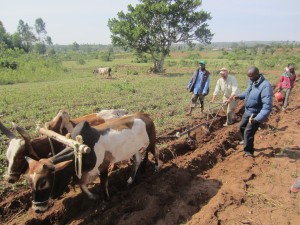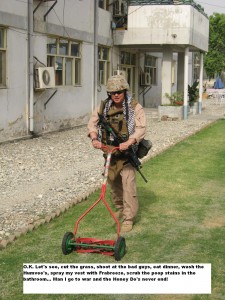Nuru House: Capt Alex Martin’s adventures continue
September 3rd, 2013 Posted in The SandGram v1.0Sundays are quiet here at Nuru House. It’s a day to sleep in, wash clothes, finish house chores, read in the hammock, have a leisurely walk, go to church…It’s a day to center. To relax. I just got in off the bus from a weekend in Nairobi (which is the opposite of relaxing) and spent the past 30 minutes staring at a concrete wall in my room thinking about how I wished I was outside in the hammock, reading. I also wished I was sipping a margarita in the hammock, but that would be impossible. Thinking of these two things at once took me thirty minutes of wall-staring. Thirty minutes! Nairobi will do that to a man.
The second week of my six week turnover with Jake was fantastic. We spent a lot of time in the field, taking meetings, getting to know our local partners, and discussing each Nuru program in-depth. I did my part by asking tons of dumb questions (I do believe there is such a thing) and listening more than I spoke (which for me, as you all well know, is some sort of miracle) and Jake did his part by patiently answering my dumb questions. It was a week in which I learned a little bit more about how things work out here – in this house, in this village, & in this country – and a little bit more about myself. This learning occurred in the same place it did back in the Marine Corps…in the field.
The Field. Nuru Kenya staff and Nuru International ex-pat staff are constantly out in the villages with our farmers, each program working to accomplish their own distinct goals, but inextricably tied to the larger mission. There is no confusion with any of the 280 staff here, the mission is to end extreme poverty here and we serve the farmers. ‘Shamba’ is Swahili for ‘farm’. This week I learned the most by walking from shamba to shamba. We were collecting loan repayments. This was not fun work, yet each farmer paid what they could, or told the Nuru Kenya staff member (who are fellow farmers from their very same communities) when they could pay at least a little something back. Loan repayment last year was 98% – an incredible figure that has been one of the benchmark of how Nuru is different from other development companies. This year will be different. Farmers in this region mostly farm maize (corn) and they do so on roughly 1-acre plots. Most farmers have just one acre, some have two…and each acre, previous to the introduction of Nuru’s planting and harversting methods and quality fertilizer inputs sold to farmers on loan, would produce 3-4 bags of maize. Each shamba has an average of 5-6 family members. It takes 6 bags of maize to feed a family until the next harvest…so, each family here was always hovering at or below the extreme poverty level. After Nuru’s inputs and training farmers were producing 20 bags of maizer per acre! And then they’d have plenty to eat, and could sell the rest. That excess money would go into the Nuru savings program and help the families sustain financial shocks, like death, which happens often out here. In Kuria West the long rains start in Feb and is harvested in August. The short rains are in-between. Here the farmers will try to plant beans or tobacco. Each season is a gamble (as it is anywhere in farming) but Nuru has experienced incredible success with the maize yields these past few years. But, like I said, this year is different. This year is different because the crops were hit with a never seen before disease, MLND. Nuru worked hard to contain the crop eating disease, and was quite successful. But then the once-in-a-decade drought came. And then a once in a life-time flood. And the farmers were flat out. As we walked from shamba to shamba we saw the effects of acts of God and nature. Families I saw had a harvest of just a single bag of maize. And so, tragically, here begins what I’m told is called the hunger season.
Observations. (1.) Hard working people take pride in not taking hand outs. Meeting these farmers and their families who knew they were on the verge of a very rough time ahead was inspiring. They smiled when we came, because they knew we were going to be there for them next season. This season they will do what they have always done, endure. I’ve never seen such pride as three hundred schillings (less than $3) was carefully fetched from a cow skin envelope hidden in a thatched roof and handed over as a partial payment for the season’s fertilizer…they knew next season would be better and they were grateful Nuru International had forgave 50% of the total loan payment, but understanding of why the other 50% must be collected…to keep the organization running. And they need Nuru’s partnership to keep moving forward. The Kenyan Women’s Micro-finance agency pulls the tin roofs off of farmer’s shacks if loans aren’t repaid. Nuru is respect based…and as such has a much higher loan repayment than KWMF. A valuable lesson. (2.) The best toys are simple toys. In the field I saw boys, maybe 8, playing with their only toy: a soccer ball-volleyball-dodgeball made of plastic bags wrapped tightly, held together by a few strands of thin rope. This toy was shared by all the boys in that valley. I kicked it back and forth with them in a lumpy dirt field. They ran after the ball and smiled and laughed. It was their great sandlot stadium. I thought about the power of a single soccer ball made of plastic bags and string. (3.) Farmers and Marines have a lot in common. My back hurt. My feet were worn. We didn’t eat or drink water because the Nuru farmers who took us from shamba to shamba didn’t eat or take water (Jake never does, in fact, he fasts from the time he leaves the Nuru house until night when he returns) and we kept going under the hot Kenyan sun. I realized how much I missed those long Marine patrols – walking that frontier-desert land with the best men. We could patrol forever. We had colt rifles and bowie knives and tobacco in our lip. We used foul language and drank black coffee. We smelled like bandits – a fantastically-foul blend of the lubricant we’d clean our rifles with, burnt garbage, and sweat. We knew honest work is hard work and hard work is the best work. And being a Marine is good, hard, honest work. We loved each other. Walking through the shambas I missed those long patrolling days. And then I laughed, because if I would have said that to the former-me actually walking the long patrol, I would have punched the shamba-walking me in the face. (4.) They are buidling a rail road from central africa, to the coast, via Tanzania. I love that I live and work in a place that still builds rail roads. Walking through the shambas I missed those long patrolling days. And then I laughed, because if I would have said that to the former-me actually walking the long patrol, I would have punched the shamba-walking me in the face.
Closing thoughts. I sat alone in a small, dark pub in the Hilton Hotel in Nairobi on Saturday night sipping on a cold draft pint. I had no smart-phone and no computer to occupy my time with google and wikipedia searches and so I asked the bar man for a pen and I set out to solve the world’s problems on a napkin. A Zambian man came up next to me and asked for a pint. We made small talk. He told me he worked for the World Bank. I ordered another beer. He lived in Maryland with his family. We talked about Zanzibar and Kenyan politics and how it’s funny that his 12 year old son could be so much cooler than he ever was. We talked about Zambia and Africa in general and everywhere else in the world and then we talked about America. He asked me how I felt about my country. I said Ioved her deeply. He said that he loved her as well. He said he thought America was “a miracle,” and we talked at length as to why and then he said that he believed our challenge was to keep it that way…I agreed. We gently touched pint glasses and at that moment I felt very lucky and blessed to be where we are from….the miracle-America.
Last bit. On one particular shamba visit I learned how to plow a field by a farmer. Being raised in southern-California and never having been much west of the I-5 freeway, I knew I was at a disadvantage, but being a Marine unable to pass on any challenge, I confidently got behind the farmer’s plow and his two cows and I started down the field. To say I was bad at plowing would be an understatement. But I kept at it….I think even the cows knew I was a coastal California kid. A pathetic excuse for a wanna-be farmer. At the end of the session I asked the farmer, with a Southern California smile, would he like to hire me to plow his fields next harvest? The farmer looked at my uneven, ugly rows, then looked back at me with sweet disgust and said, flatly: “no.”
And that’s how I’ll leave it…with that personal failure-vignette that demonstrates no matter what your position or status in the world there’s some wonderfully humble-farmer-expert out there knowing you suck, and isn’t afraid to tell you so.
That’s learning.
Much respect and love to all,
asm, american.
p.s. picture of said plowing-fail attached. I’ll be a farmer yet!






